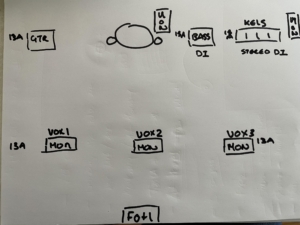13 Tips for Gigging Professionally
Rowan McDonagh
1. Put together a stage plot
This is a drawing of your setup on stage which should go to the booker or production manager ahead of your live performance.

As soon as you’re booked for a gig, send them this and they’ll pass it onto the venue/stage crew. The drawing should include where you need:
- power on the stage
- Direct Inputs
- monitors
- elements of drum kit noting if your drummer is left-handed for example.
This will save you time having to explain everything on the spot + it will help everything run more efficiently.
Your drawing should be Landscape orientation and it should fit on one page.
Most stage crew will stick them up on a wall backstage so it should be clear and easy to reference quickly.
2. Compile your tech requirements
If there are outstanding requirements not captured in your stage plot, send an accompanying list. For example:
- Perhaps you’re going to bring your own in-ear monitors and will need an XLR OUT from the desk
- Maybe you’ll need phantom power for a particular mic you want to bring
- Any lighting preferences
- Whether you’re bringing a sound engineer
Include a link to your music so technicians can get a sense of what you’re about. This can be really helpful.
All in all, your stage plot and list of requirements should capture:
- what you have
- where you have it
- what you need to make your setup work
3. Ask for the venue’s tech setup
Ask your point of contact for the venue tech setup. This list of details should include what the backline is made up of.
If you want the venue to add anything to that, e.g., a specific amp, it could come out of your fee so try to use anything the house has to accommodate you.
4. Be cognisant of your rider
Venues will often offer you a rider, generally it’s a couple of beers and some bottled water. After that, any additional items you request come out of your fee.
5. Rehearse your changeover
You’ll be given a changeover time. This is you time you have to set up right before your performance, i.e., after a previous act has left the stage.
Make sure you arrive at the venue 2 hours before your changeover time and ensure you’re standing at the stage at your changeover time ready to go, guitar tuned/voice warmed up etc.
Rehearse your changeover. If your changeover is 20 minutes long, make sure you can do it in 10 minutes. Have your gear gone from packed to set up in that time and rehearse it before the gig.
If your changeover runs over time, every minute you delay eats into your set time, so perhaps drop a song if that happens.
6. Time your set rehearsal
Adapt your set so that it fits within your allocated time. Rehearse it and time that rehearsal. Any change of instruments or reorganising the stage mid-set should be captured within your allocated time slot so work this into your rehearsal. Stage crews deal in minutes.
If you have found that your set takes less time than what has been allocated to you, tell the booker ahead of time so they can plan accordingly. Any surprise changes to timings on the night will knock everyone’s time out.
7. Prep your gear
Prep your gear before arriving. Don’t have cables in a mess, have everything ready and labelled so it’s easy to take out, set up and pack away afterwards.
8. Introduce yourself
When you arrive at the venue, introduce yourself to the stage manager and ask to meet the sound engineer and lighting engineer so they know who you are.
Get the names of the stage crew and ensure they know you. You’ll likely develop relationships with these people and meet them again gigging.
9. Keep amps low on stage
Always ask for more in the wedge instead of tweaking your amp.
10. Always send a clean signal from the stage
The sound engineer will add EQ and compression to suit the house so leave your signal clean at the source. Go through pedals and any different effects with the sound engineer during your soundcheck.
11. Stage manager is the boss
The stage manager is getting feedback from all angles, across the venue so wait for their signal to go on stage.
If ever they tell you to stop playing, it’s for a very good reason. Perhaps there’s a serious accident in the audience. Always heed their direction.
12. Never show up under the influence
That will be remembered and you will get a bad name.
13. Don’t bring open drinks on stage
Everything on stage is needed by many performers. Don’t bring open drinks on stage, unless it’s a bottle of water with a cap on it. It’s a mark of respect to stage crews. Entire rigs have been destroyed by a pint and it’s dangerous.

